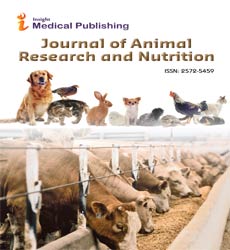Abstract
The Effect of Sex and Weaning Age on Growth Performance of First Generation Lambs Derived from Crossing ÃÆââ¬Å¡ÃâýRomanov and Zel
The increase in birth rate is one of the most important objectives in sheep breeding. One way to increase the birth rate and yield is to hybrid the weak native breeds with those of strong from the view point. To this aim, the study has investigated the effects of sex and weaning age on the first-generation lambs growth result according to ½Romanov and Zel. Also it has used the completely randomized factorial experiments with 6 treatment and 4 replication. The lambs weaning age has been 40, 50 and 75 days. The experimental diets have been the same to the all treatments in terms of energy, protein and other nutrients. The feed intake given to lambs has been measured and weighed with interval specification. By evaluating the feed consumption results and daily weighing, in 2 first weeks, as well as fourth and fifth weeks, there were significant differences have been observed in sex and weaning age (p<0.05). In the fourth 2 weeks, a significant statistical difference has observed in the feed conversion ratio (p<0.05). By result investigation, it has been observed that the male lambs have had better performances than the females in the term of feed consumption, feed conversion ratio and daily weight gaining during the experiment weeks. The lambs of 75 days have had the best performance in feed consumption and daily weight gain.
Author(s):
Seyed MakanMousavi Kashani, Mehdi Bahari
Abstract | Full-Text | PDF
Share this

Google scholar citation report
Citations : 764
Journal of Animal Research and Nutrition received 764 citations as per google scholar report
Abstracted/Indexed in
- Google Scholar
- China National Knowledge Infrastructure (CNKI)
- WorldCat
- International Committee of Medical Journal Editors (ICMJE)
- Secret Search Engine Labs
Open Access Journals
- Aquaculture & Veterinary Science
- Chemistry & Chemical Sciences
- Clinical Sciences
- Engineering
- General Science
- Genetics & Molecular Biology
- Health Care & Nursing
- Immunology & Microbiology
- Materials Science
- Mathematics & Physics
- Medical Sciences
- Neurology & Psychiatry
- Oncology & Cancer Science
- Pharmaceutical Sciences

